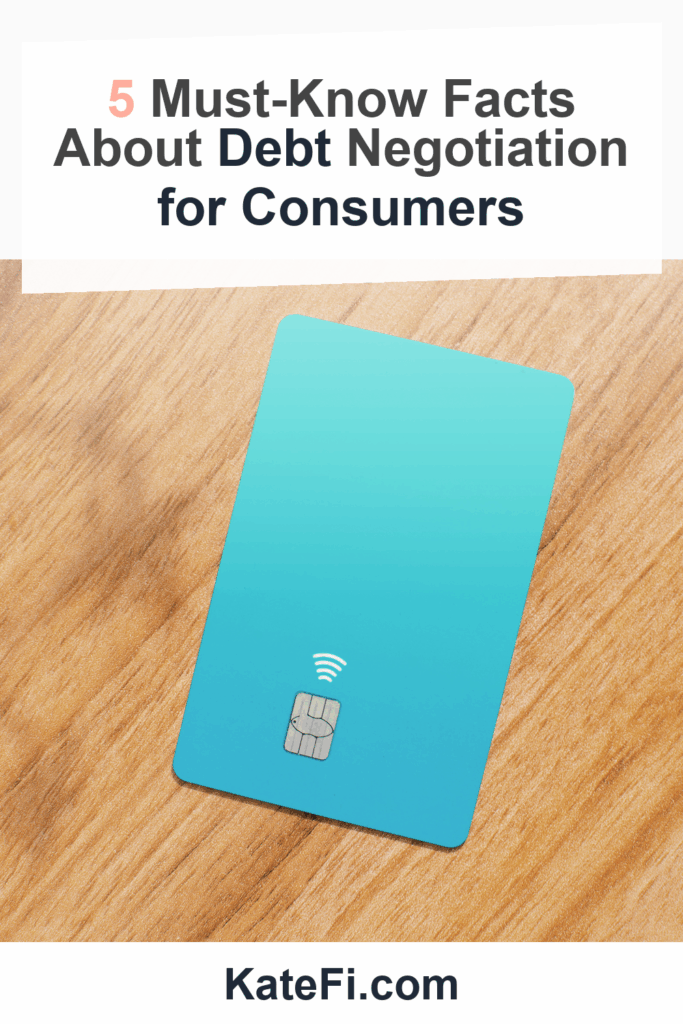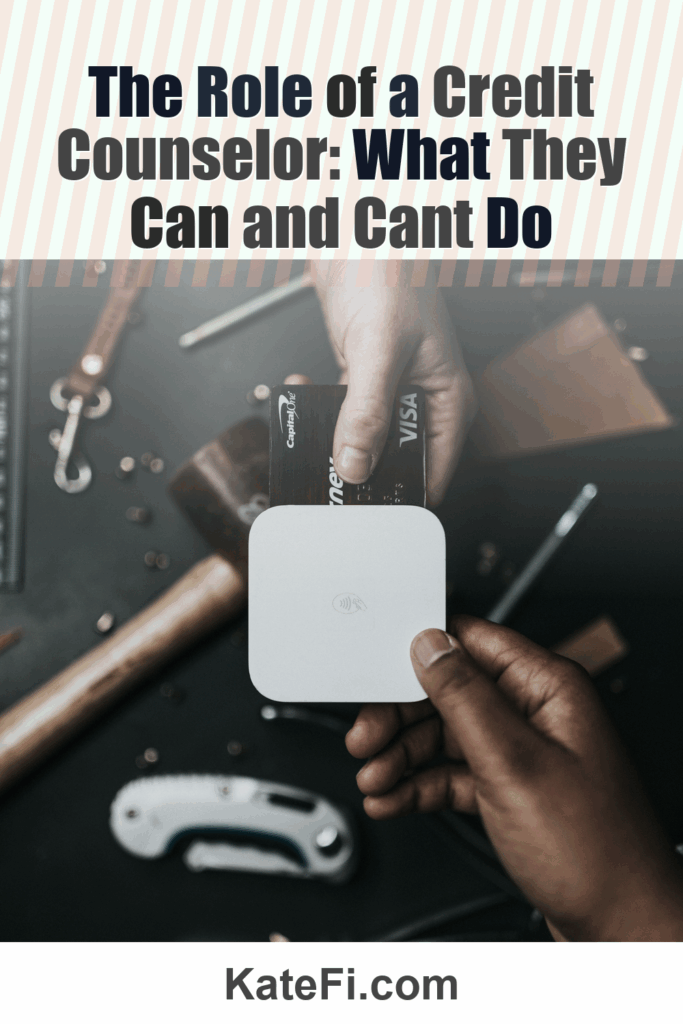6 Tips for a Successful Debt Negotiation: Increase Your Chances of Success
Navigating through debt can often feel like an uphill battle. However, with strategic planning and negotiation, it is possible to reduce what you owe and regain control of your financial future. The journey to financial freedom can seem daunting, but successful debt negotiation can ease your burden and offer you a path toward a healthier financial outlook. Below, we present you with six valuable tips to enhance your negotiation skills, ensuring that you not only settle your debts but also understand the implications on your credit score.
Love our content? Show your support by following us — pretty please!🥺
FOLLOW ON PINTEREST
Hi! I’m Kate, the face behind KateFi.com—a blog all about making life easier and more affordable.
1. Do Your Homework: Know Your Numbers
👉 Start Your Free Debt Relief Review
Not available in IL, KS, OR, TN, UT, WV.
Before entering into negotiations with creditors, it’s essential to come prepared. Gather all relevant documents related to your debts, including account statements, interest rates, payment history, and your current financial situation. Understanding your total debt load, monthly expenses, and income will provide you with a clearer picture of what you can afford.
Checklist for Preparation:
- List all debts (credit cards, loans, etc.).
- Note the outstanding balance and interest rates.
- Assess your monthly budget and surplus income.
- Gather any relevant communication from creditors.
Knowing these numbers allows you to present a solid case to your creditors and may increase your chances of negotiating a favorable settlement.
✅ See If You Qualify for Debt Relief
2. Be Honest About Your Financial Situation
When negotiating with creditors, honesty is the best policy. Explain your financial hardship in a straightforward manner. Creditors are more likely to work with you if they understand your genuine struggles and see that you are taking proactive steps to resolve your debts.
Script for Negotiation:
“Hello, my name is [Your Name]. I’ve been facing some financial challenges due to [specific reason, e.g., job loss, medical expenses], and I’m unable to keep up with my payments. I’m committed to resolving this matter and would like to discuss potential options for reducing my debt.”
Being transparent can foster a sense of trust, and many creditors have programs in place to assist customers who are experiencing difficulties.
3. Aim for a Realistic Settlement Offer
What You’ll Learn on the Call
- Estimated timeline and monthly payment range
- How credit may be affected in the short term
- What documents to gather to move faster
Not available in IL, KS, OR, TN, UT, WV.
While it might be tempting to ask for a large reduction in your debt, it’s crucial to be realistic in your negotiation. Creditors are often willing to accept a lump-sum payment for a fraction of the total debt owed, but your offer should reflect what you can genuinely afford.
Comparison Table: Settlement Options vs. Total Debt:
| Total Debt Owed | Proposed Settlement Offer | Estimated Savings |
|---|---|---|
| $10,000 | $6,000 | $4,000 |
| $5,000 | $2,500 | $2,500 |
| $15,000 | $9,000 | $6,000 |
Calculating your offer using this framework will help in formulating a proposal that is more likely to be accepted.
✅ See If You Qualify for Debt Relief
4. Understand the Credit Score Impact: Short-Term vs. Long-Term
Lower Your Unsecured Debt
If you have $5,000+ in credit card or personal loan debt, a free consult can review options like settlement or hardship plans.
- One-on-one call to review your debts and goals
- See potential monthly payment reductions
- No obligation to enroll
Not available in IL, KS, OR, TN, UT, WV.
It’s vital to understand that negotiating your debt can have implications for your credit score. Short-term, you might see a dip in your score due to missed payments or a settled account marked as “settled” instead of “paid in full.” However, long-term, you can potentially improve your credit score by getting out of debt faster and maintaining a better payment history on remaining debts.
Key Considerations:
- Short-Term Impact: Missing payments during negotiation may lead to a decline in your credit score.
- Long-Term Impact: Settling debts can free up financial resources, allowing for timely payments in other areas and eventual recovery of your credit score.
Navigating these trade-offs can be complex, but it is crucial to have a strategy in place. Consult a professional for personalized advice, and consider getting a free consultation to discuss your options.
5. Follow Up: Persistence is Key
Once you’ve submitted your offer, don’t just sit back and wait. Following up is a critical part of the negotiation process. If you haven’t heard back within a reasonable time, reach out to your creditor to check on the status of your proposal.
Checklist for Follow-Up:
- Wait 1-2 weeks after your initial offer.
- Call the creditor and inquire about your proposal.
- Keep a record of all communications.
Your persistent efforts can show your creditors that you are serious about resolving your debts, which may improve your chances of achieving a favorable outcome.
✅ See If You Qualify for Debt Relief
6. Know When to Seek Professional Help
Sometimes, despite your best efforts, negotiating debt on your own can be overwhelming. If you feel uncertain about how to proceed or if negotiations aren’t yielding results, consider seeking professional assistance. Debt relief companies can offer structured support, often negotiating on your behalf and helping to navigate the complexities of debt resolution.
Before choosing a professional service, ensure they are reputable. Research reviews and credentials, and make sure they provide transparency regarding their fees and services.
Key Questions to Ask:
- What are your fees?
- How do you plan to negotiate on my behalf?
- What kind of results can I realistically expect?
Remember that engaging with a professional doesn’t guarantee results, and outcomes may vary by situation and state.
Gather Essential Documents for a Smoother Process
To expedite the review process, collect the following documents:
- Income statements (pay stubs, tax returns).
- Statements from creditors detailing current balances and terms.
- Budget documentation showing your monthly income and expenses.
Having this information readily available will streamline your consultation and ensure that your negotiator has all the tools necessary to advocate effectively for you.
✅ See If You Qualify for Debt Relief
Important: This content is for education only—not legal, tax, or financial advice. Results and eligible programs vary by situation and state. Fees apply if you enroll and complete a program. Debt relief can affect credit; missed payments may lead to collections/lawsuits. Not available in IL, KS, OR, TN, UT, WV.
In conclusion, successful debt negotiation is attainable with the right approach and preparation. By understanding your financial situation, negotiating honestly, and being persistent, you can increase your chances of a successful outcome. Don’t hesitate to reach out for professional help if you need it. Consider getting a free consultation today to explore your options and take a significant step towards financial relief.






















